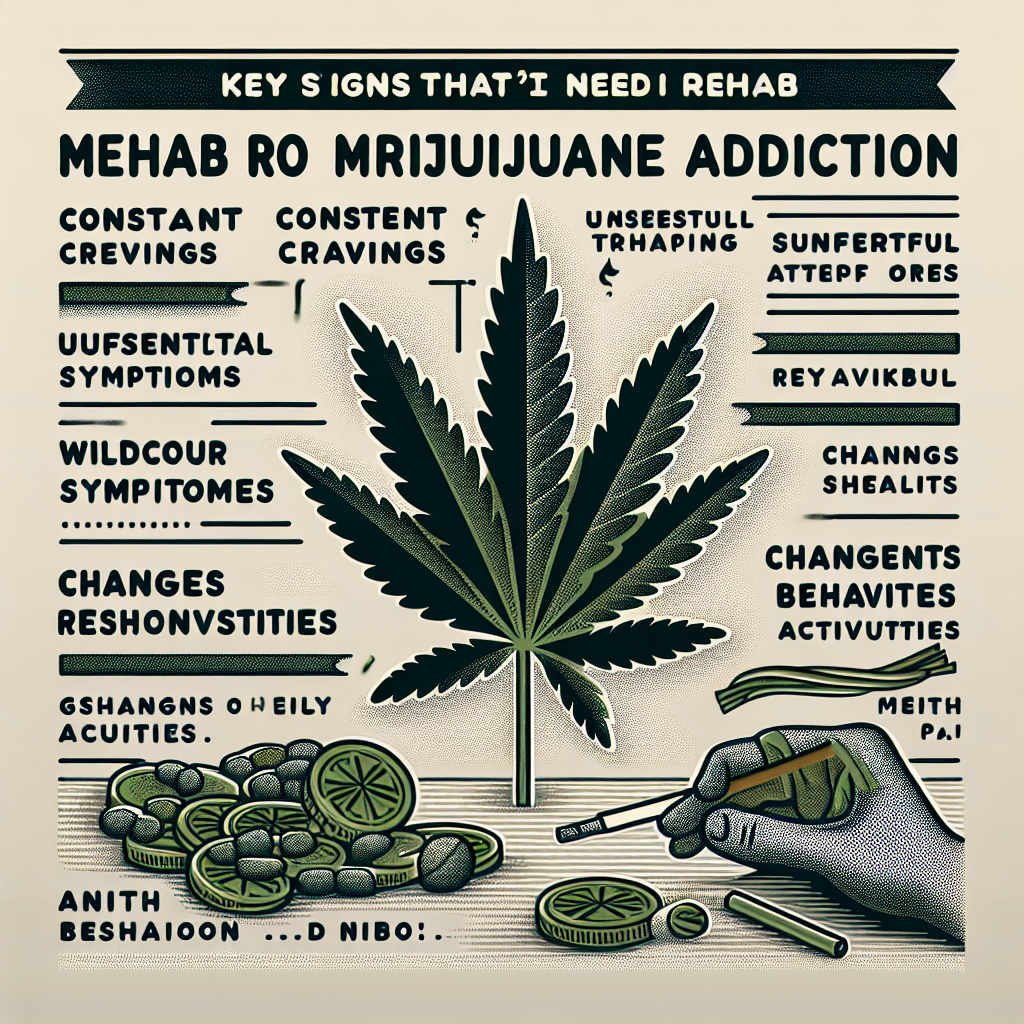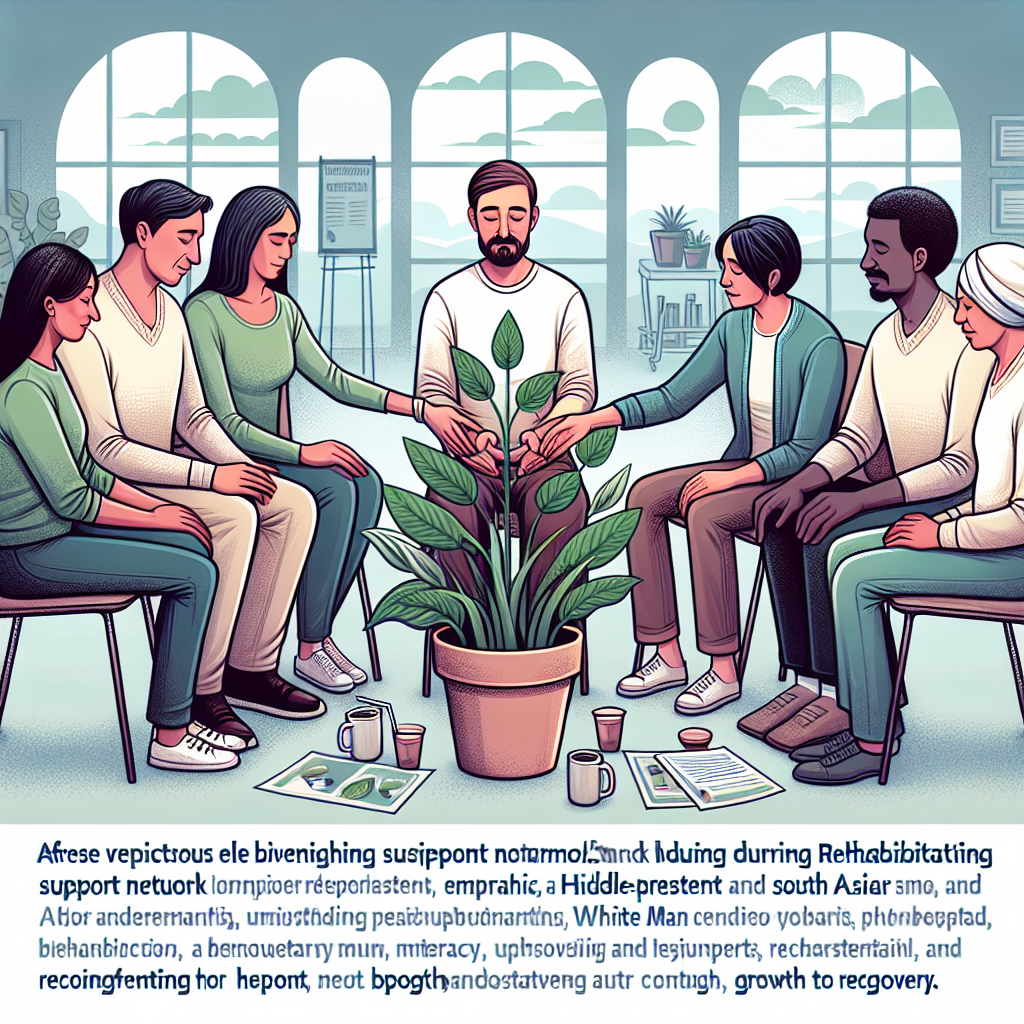-
Table of Contents

“Recognize the signs: Dependence, withdrawal, neglecting responsibilities, and failed attempts to quit signal the need for rehab.”
Introduction
Recognizing the need for rehabilitation for marijuana and codeine addiction involves identifying several key signs and symptoms that indicate a dependency on these substances. These signs can be physical, psychological, and behavioral. Physically, individuals may experience withdrawal symptoms such as irritability, insomnia, and cravings when not using the substances. Psychologically, there may be an increased tolerance, meaning more of the substance is needed to achieve the same effect, and a preoccupation with obtaining and using the drugs. Behaviorally, addiction can manifest as neglect of responsibilities, strained relationships, and a loss of interest in activities once enjoyed. Additionally, unsuccessful attempts to quit or cut down on use, despite recognizing the negative impact on one’s life, are strong indicators that professional help may be necessary. If these signs are present, seeking rehabilitation can provide the structured support and treatment needed to overcome addiction and regain control over one’s life.
Recognizing Behavioral Changes: Signs You Need Rehab for Marijuana and Codeine Addiction
Recognizing behavioral changes is crucial when determining if you need rehab for marijuana and codeine addiction. Often, individuals may not realize the extent of their dependency until it significantly impacts their daily lives. One of the first signs to look out for is a noticeable shift in your daily routine and priorities. If you find yourself increasingly preoccupied with obtaining and using marijuana or codeine, to the detriment of your responsibilities and relationships, this could be a red flag. You might start neglecting work, school, or family obligations, and your performance in these areas may begin to suffer.
Another significant indicator is the development of tolerance and withdrawal symptoms. Over time, your body may require larger amounts of the substances to achieve the same effects, which is a clear sign of physical dependence. When you try to cut back or stop using, you might experience withdrawal symptoms such as irritability, anxiety, insomnia, or physical discomfort. These symptoms can be particularly challenging to manage on your own and often necessitate professional intervention.
Changes in your social life can also be telling. You may start isolating yourself from friends and family who do not use these substances, preferring instead to spend time with those who share your habits. This shift can lead to a sense of loneliness and alienation, further exacerbating your reliance on marijuana and codeine as coping mechanisms. Additionally, you might find yourself engaging in risky behaviors, such as driving under the influence or using these substances in unsafe environments, which can have serious legal and health consequences.
Emotional and psychological changes are equally important to recognize. Substance abuse can lead to mood swings, depression, and anxiety. You might feel a pervasive sense of hopelessness or find it difficult to experience joy in activities that once brought you pleasure. These emotional struggles can create a vicious cycle, where you use marijuana and codeine to numb the pain, only to find that the underlying issues remain unresolved and often worsen over time.
Financial difficulties can also be a sign that your substance use is out of control. If you are spending a significant portion of your income on marijuana and codeine, to the point where you are struggling to pay bills or afford necessities, this is a clear indication that your priorities have shifted in an unhealthy direction. The financial strain can add to your stress and anxiety, making it even harder to break free from the cycle of addiction.
Physical health issues should not be overlooked. Chronic use of marijuana can lead to respiratory problems, while codeine abuse can cause gastrointestinal issues, liver damage, and other serious health complications. If you notice a decline in your physical well-being, such as frequent illnesses, unexplained weight loss, or a general sense of malaise, it is essential to consider the role that substance abuse may be playing in these symptoms.
Recognizing these behavioral changes is the first step toward seeking help. It is important to remember that addiction is a medical condition, not a moral failing. Seeking rehab is a courageous and proactive decision that can lead to a healthier, more fulfilling life. Professional treatment programs offer the support, resources, and guidance needed to overcome addiction and build a strong foundation for long-term recovery. By acknowledging the signs and taking action, you can reclaim control over your life and embark on a journey toward healing and self-discovery.
Physical and Psychological Indicators: When to Seek Rehab for Marijuana and Codeine Dependency
Recognizing the signs that you need rehab for marijuana and codeine addiction can be a crucial step toward reclaiming your life. Both substances, while often perceived as less harmful compared to other drugs, can lead to significant physical and psychological dependencies. Understanding the indicators that suggest the need for professional help can empower you to make informed decisions about your health and well-being.
One of the primary physical indicators of marijuana and codeine addiction is the development of tolerance. Over time, your body may require higher doses to achieve the same effects, which can lead to increased consumption and a greater risk of overdose. This escalation is often accompanied by withdrawal symptoms when you attempt to reduce or stop using the substances. For marijuana, these symptoms might include irritability, insomnia, and loss of appetite. Codeine withdrawal, on the other hand, can be more severe, presenting with symptoms such as muscle aches, nausea, vomiting, and severe cravings.
In addition to physical symptoms, psychological indicators play a significant role in identifying the need for rehab. One of the most telling signs is the inability to control your use despite knowing the negative consequences. This loss of control can manifest in various ways, such as neglecting responsibilities at work, school, or home, and continuing to use despite experiencing relationship problems or legal issues. Furthermore, you might find yourself spending a considerable amount of time thinking about, obtaining, and using these substances, which can detract from other important aspects of your life.
Another psychological sign is the presence of mental health issues that either co-occur with or are exacerbated by substance use. Anxiety, depression, and mood swings are common among individuals struggling with marijuana and codeine addiction. These mental health challenges can create a vicious cycle, where substance use temporarily alleviates symptoms but ultimately worsens them over time. If you notice that your mental health is deteriorating and that you are using marijuana or codeine as a coping mechanism, it may be time to seek professional help.
Social indicators are also crucial in determining the need for rehab. Isolation from friends and family, a decline in social activities, and a shift in social circles to those who also use substances can be red flags. These changes often stem from the desire to hide your use or to avoid judgment, but they can lead to further isolation and a deeper entrenchment in addictive behaviors. If you find that your relationships are suffering and that you are increasingly withdrawing from social interactions, it may be an indication that rehab is necessary.
Financial difficulties can also signal the need for intervention. The cost of maintaining a marijuana and codeine habit can quickly add up, leading to financial strain. You might find yourself borrowing money, selling possessions, or even engaging in illegal activities to fund your addiction. These behaviors not only jeopardize your financial stability but also increase the risk of legal consequences.
Recognizing these signs and acknowledging the need for rehab is a courageous step. It is important to remember that seeking help is not a sign of weakness but a testament to your strength and commitment to a healthier future. Rehab programs offer a structured environment where you can receive medical support, counseling, and the tools necessary to overcome addiction. By addressing both the physical and psychological aspects of dependency, rehab can pave the way for lasting recovery and a renewed sense of purpose. Taking this step can transform your life, allowing you to rediscover joy, rebuild relationships, and achieve your full potential.
Q&A
1. **What are the signs that I need rehab for marijuana addiction?**
– Inability to control or reduce marijuana use despite wanting to quit.
– Neglecting responsibilities at work, school, or home due to marijuana use.
2. **What are the signs that I need rehab for codeine addiction?**
– Developing a tolerance, needing more codeine to achieve the same effect.
– Experiencing withdrawal symptoms such as nausea, sweating, or irritability when not using codeine.
Conclusion
Signs that you may need rehab for marijuana and codeine addiction include:
1. Inability to control or reduce use despite wanting to.
2. Neglecting responsibilities at work, school, or home.
3. Experiencing withdrawal symptoms when not using.
4. Developing a tolerance, needing more to achieve the same effect.
5. Spending a significant amount of time obtaining, using, or recovering from the substances.
6. Continuing use despite negative physical, psychological, or social consequences.
7. Loss of interest in activities once enjoyed.
8. Using in dangerous situations, such as driving.
9. Experiencing cravings or strong urges to use.
10. Relationship problems caused by substance use.
If you recognize these signs in yourself, it may be time to seek professional help through rehab.



